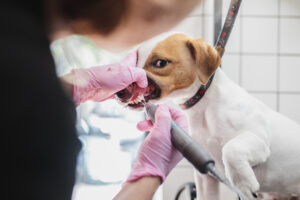As our beloved pets age, they enter their golden years, a time marked by a slower pace, cherished memories, and unique challenges. Just like humans, senior pets experience changes in their bodies and minds.
While we can’t stop the aging process, we can ensure that our furry companions enjoy their golden years with comfort, dignity, and joy through comprehensive senior pet care. Comfort care focuses on managing pain, enhancing quality of life, and providing the love and support our senior pets deserve.
Understanding the Needs of Senior Pets
Senior pets often face various health issues, including arthritis, dental problems, cognitive decline, and decreased mobility. These conditions can cause pain, discomfort, and anxiety, affecting their overall quality of life. Recognizing the signs of aging in your pet is crucial for providing appropriate senior pet care.
Signs of Aging in Pets that Require Senior Pet Care:
- Reduced activity levels: Your pet may sleep more, move slower, and have less interest in play.
- Stiffness or difficulty moving: Arthritis or joint problems can make it painful for your pet to walk, climb stairs, or jump.
- Changes in appetite or weight: Senior pets may experience changes in their appetite or weight due to dental problems, decreased metabolism, or underlying health issues.
- Increased thirst or urination: Kidney or urinary tract problems are more common in older pets and can lead to changes in drinking and urination habits.
- Cognitive decline: Your pet may seem confused, disoriented, or have difficulty recognizing familiar people or places.
- Changes in behavior: Some senior pets may become more anxious, fearful, or irritable due to pain, discomfort, or cognitive decline.
Embracing the Golden Years with Senior Pet Care
Cherishing your senior pet’s golden years involves providing love, comfort, and the best possible care. By understanding their unique needs and implementing appropriate senior pet care strategies, you can ensure that your furry friend enjoys their later years to the fullest. Remember, every day with your senior pet is a gift, so cherish every moment and make the most of this special time together.
Financial Considerations for Senior Pet Care
Caring for a senior pet often involves additional expenses compared to their younger years. Regular veterinary check-ups, medications, special diets, supplements, and potential therapies like acupuncture or massage can add up. It’s essential to be prepared for these financial considerations to ensure your pet receives the best possible senior pet care without straining your budget.
Budgeting for Senior Pet Care
- Pet Insurance: If your pet isn’t already insured, consider getting pet insurance while they are still young and healthy. This can help cover unexpected veterinary expenses that may arise as your pet ages.
- Savings: Set aside funds specifically for your pet’s senior care. This can help you cover routine check-ups, medications, and any unexpected health issues that may arise.
- Financial Assistance: Explore resources like CareCredit or ask your veterinarian about payment plans if you’re facing financial challenges. Several organizations offer financial assistance for pet care to those in need.
Creative Ways to Manage Senior Pet Care Costs
- Homemade Diets: If your veterinarian approves, you can explore homemade diets for your senior pet. These diets can be tailored to your pet’s specific needs and can be more affordable than some commercial senior pet foods.
- DIY Enrichment: Create your own interactive toys and puzzles using household items like cardboard boxes, empty toilet paper rolls, and treats. This can provide mental stimulation for your pet without breaking the bank.
- Community Resources: Check for community resources like low-cost veterinary clinics or senior pet care programs that may offer discounts or financial assistance.
The Emotional Aspect of Senior Pet Care
Caring for a senior pet can be emotionally challenging, especially as you witness the physical and cognitive changes they experience. It’s essential to be patient, understanding, and compassionate during this time.
Celebrate the joy and companionship your senior pet continues to bring to your life, and don’t hesitate to seek support from friends, family, or pet loss support groups if needed.
Cherishing Every Moment
The golden years of your pet’s life are precious. By providing attentive senior pet care, managing pain, and prioritizing their comfort and happiness, you can create lasting memories and ensure that your beloved companion enjoys a fulfilling and dignified life. Remember, the love and care you give your senior pet during this time is a testament to the special bond you share.
Senior Pet Care: Home Modifications
- Easy Access: Ramps or stairs can help your senior pet access favorite spots like beds and couches without straining their joints.
- Non-Slip Surfaces: Consider adding non-slip rugs or mats to prevent falls, especially on slippery floors like tile or hardwood.
- Comfortable Bedding: Provide orthopedic beds or cushioned mats for extra support and comfort.
- Warmth and Comfort: Senior pets may be more sensitive to cold temperatures. Provide warm blankets and consider heated beds during colder months.
- Safe Spaces: Designate quiet areas in your home where your senior pet can retreat and rest undisturbed.
Senior Pet Care: Daily Routines and Activities
- Gentle Exercise: Regular, low-impact exercise like short walks or swimming can help maintain muscle mass and joint flexibility.
- Mental Stimulation: Offer puzzle toys, interactive feeders, and training games to keep your pet’s mind sharp and prevent boredom.
- Socialization: Continue to provide opportunities for social interaction with other pets or people, as long as it’s not stressful for your senior pet.
- Grooming: Regular grooming is essential for maintaining your pet’s hygiene and comfort. Be gentle and patient, as older pets may have more sensitive skin and joints.
- Monitoring: Keep a close eye on your pet’s behavior and habits. Any changes in appetite, thirst, energy levels, or bathroom habits should be discussed with your veterinarian.
The Importance of Emotional Well-being in Senior Pet Care
As pets age, they may experience anxiety, confusion, or depression. It’s crucial to provide them with emotional support and reassurance. Spend quality time with your pet, offering gentle petting, brushing, and quiet conversations. Consider using calming pheromone diffusers or supplements if recommended by your veterinarian.
Saying Goodbye: End-of-Life Decisions in Senior Pet Care
As difficult as it is, discussing end-of-life care with your veterinarian is a crucial part of senior pet care. Together, you can create a plan that prioritizes your pet’s comfort and dignity, whether that involves palliative care, hospice, or ultimately, euthanasia.
Remember, the goal of senior pet care is to provide your beloved companion with the best possible quality of life during their golden years. By understanding their changing needs and implementing a comprehensive care plan, you can ensure that your pet enjoys their remaining time with comfort, love, and joy.
Get started today by joining the Truffle Paws family and embrace a worry-free pet parenthood journey.







